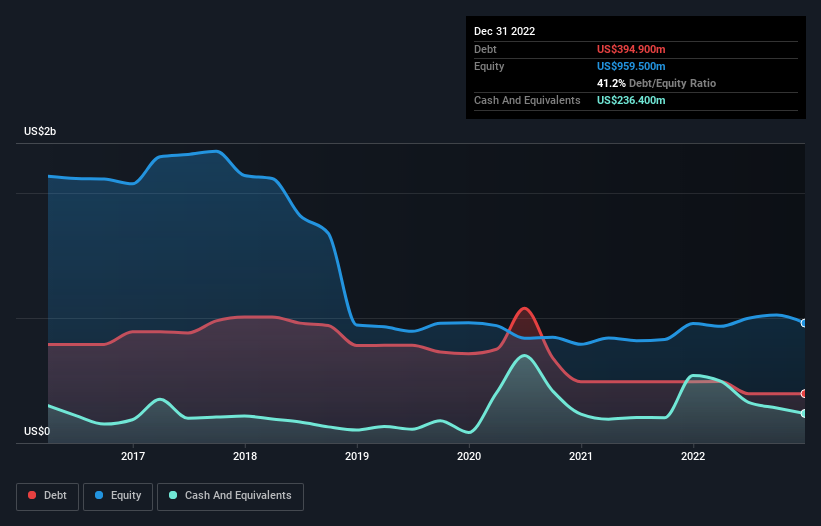
David Iben put it well when he said, 'Volatility is not a risk we care about. What we care about is avoiding the permanent loss of capital.' It's only natural to consider a company's balance sheet when you examine how risky it is, since debt is often involved when a business collapses. We can see that New Gold Inc. (TSE:NGD) does use debt in its business. But the more important question is: how much risk is that debt creating?
When Is Debt A Problem?
Generally speaking, debt only becomes a real problem when a company can't easily pay it off, either by raising capital or with its own cash flow. In the worst case scenario, a company can go bankrupt if it cannot pay its creditors. While that is not too common, we often do see indebted companies permanently diluting shareholders because lenders force them to raise capital at a distressed price. Of course, plenty of companies use debt to fund growth, without any negative consequences. When we examine debt levels, we first consider both cash and debt levels, together.
See our latest analysis for New Gold
What Is New Gold's Debt?
The image below, which you can click on for greater detail, shows that New Gold had debt of US$394.9m at the end of December 2022, a reduction from US$491.0m over a year. However, it does have US$236.4m in cash offsetting this, leading to net debt of about US$158.5m.

A Look At New Gold's Liabilities
We can see from the most recent balance sheet that New Gold had liabilities of US$171.2m falling due within a year, and liabilities of US$1.11b due beyond that. Offsetting this, it had US$236.4m in cash and US$15.9m in receivables that were due within 12 months. So its liabilities outweigh the sum of its cash and (near-term) receivables by US$1.03b.
This deficit casts a shadow over the US$642.8m company, like a colossus towering over mere mortals. So we'd watch its balance sheet closely, without a doubt. After all, New Gold would likely require a major re-capitalisation if it had to pay its creditors today. The balance sheet is clearly the area to focus on when you are analysing debt. But ultimately the future profitability of the business will decide if New Gold can strengthen its balance sheet over time. So if you want to see what the professionals think, you might find this free report on analyst profit forecasts to be interesting.
Over 12 months, New Gold made a loss at the EBIT level, and saw its revenue drop to US$604m, which is a fall of 19%. That's not what we would hope to see.
Caveat Emptor
Not only did New Gold's revenue slip over the last twelve months, but it also produced negative earnings before interest and tax (EBIT). Indeed, it lost US$18m at the EBIT level. When we look at that alongside the significant liabilities, we're not particularly confident about the company. We'd want to see some strong near-term improvements before getting too interested in the stock. Not least because it burned through US$102m in negative free cash flow over the last year. That means it's on the risky side of things. For riskier companies like New Gold I always like to keep an eye on whether insiders are buying or selling. So click here if you want to find out for yourself.
Of course, if you're the type of investor who prefers buying stocks without the burden of debt, then don't hesitate to discover our exclusive list of net cash growth stocks, today.
Valuation is complex, but we're here to simplify it.
Discover if New Gold might be undervalued or overvalued with our detailed analysis, featuring fair value estimates, potential risks, dividends, insider trades, and its financial condition.
Access Free AnalysisHave feedback on this article? Concerned about the content? Get in touch with us directly. Alternatively, email editorial-team (at) simplywallst.com.
This article by Simply Wall St is general in nature. We provide commentary based on historical data and analyst forecasts only using an unbiased methodology and our articles are not intended to be financial advice. It does not constitute a recommendation to buy or sell any stock, and does not take account of your objectives, or your financial situation. We aim to bring you long-term focused analysis driven by fundamental data. Note that our analysis may not factor in the latest price-sensitive company announcements or qualitative material. Simply Wall St has no position in any stocks mentioned.
About TSX:NGD
New Gold
An intermediate gold mining company, engages in the development and operation of mineral properties in Canada.
High growth potential with excellent balance sheet.
Similar Companies
Market Insights
Community Narratives





